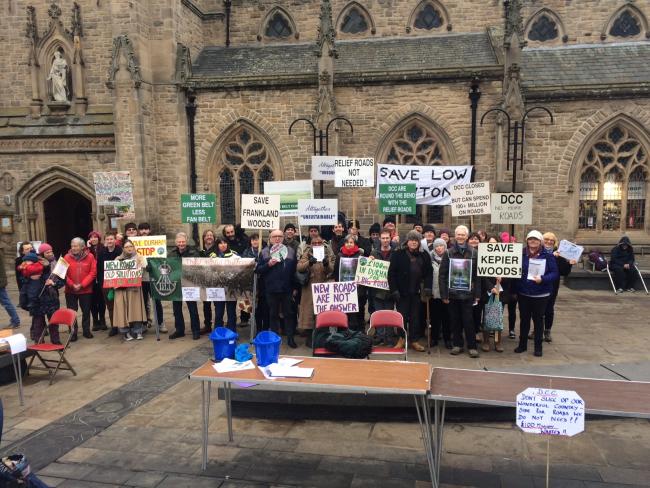CAMPAIGNERS made their views against two proposed relief roads very clear when they staged a protest.
“What do we want? No roads,” was the cry from dozens of objectors who gathered in Durham Market Place on Saturday.
They oppose Durham County Council’s proposals to build northern and western relief roads for the city, saying they would be an unnecessary waste of money and ruin the character of rural and suburban areas.
Jonathan Elmer, from Durham Road Block, which coordinates the campaign, said: “There is a common preconception that building roads reduces congestion, yet all of the research so far, and experience across the country, shows that new roads actually generate more traffic.
“When you build a new road you create a more comfortable driving environment which eventually leads to more traffic, we have seen it in County Durham at Spennymoor and Bishop Auckland and even worse at Felling and Newcastle.
“You also create a new outer boundary to the city and will inevitably get infill development– in 20 years time you have 50,000 new houses and 150,000 extra cars and are back to square one.“We’re not anti-car, congestion in Durham is really not that bad, and we need more sustainable, alternative solutions.”

Proposed routes for the northern relief road, linking Newton Hall and the A690 near Belmont, and western relief road, between the B6302 near Stonebridge and the A691 at Sniperley, feature in the latest draft of the County Durham Plan.
Stuart Timmiss, head of planning and assets, said: “The County Durham Plan aims to ensure we have enough housing to meet the needs of our growing population, to bring forward employment sites that attract more and better jobs to the area and provide the necessary infrastructure, such as relief roads, to allow this to happen.
“The proposal for a northern relief road is not intended to increase road capacity as it would allow us to reduce traffic in and around the city centre, creating the opportunity to increase sustainable travel options, such as more bus lanes and improved and safer cycling provision, improving air quality.
“While car use is expected to grow in line with an increasing population, the evidence shows the approach outlined in the plan would not increase the capacity of the road network and would not result in an increase to the number of cars on the road.”
When a previous version of the Plan was thrown out, the relief road proposals were described by an independent planning inspector as “not justified, deliverable or environmentally acceptable”.
Mr Elmer added: “Durham County Council has completely disregarded the professional, technical advice on this matter. We want councillors to appreciate that people do not want these roads and would prefer the alternatives to be developed.”



Comments: Our rules
We want our comments to be a lively and valuable part of our community - a place where readers can debate and engage with the most important local issues. The ability to comment on our stories is a privilege, not a right, however, and that privilege may be withdrawn if it is abused or misused.
Please report any comments that break our rules.
Read the rules hereLast Updated:
Report this comment Cancel